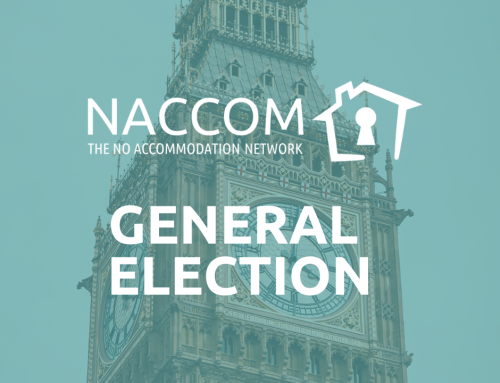In December 2020, NACCOM supported two experts by experience to give evidence to a panel of MPs at the Housing, Communities and Local Government (HCLG) Select Committee looking at the impact of Covid-19 on the homeless and the private rented sector. This was part of the evidence gathering process and an important opportunity for people who have direct experience of homelessness within the immigration system to be heard.
Sam* and Abeo* (*names have been changed) gave powerful statements about their personal experiences of homelessness and destitution whilst subject to immigration control, and highlighted how gaps in service provision, particularly for those who have No Recourse to Public Funds (NRPF) restrictions, and the fear and anxiety caused by uncertainties around accessing support, were exacerbated by Covid-19. The full transcript of their evidence is available here.
How has the NRPF restriction affected people during the pandemic?
Abeo gave powerful evidence at the @CommonsHCLG Select Committee, explaining how he struggled to access food and accommodation, despite his underlying health problems.
His full story ➡️ https://t.co/yXv4OnWrx7 pic.twitter.com/NNjTS5DJ8E
— NACCOM (@NACCOMnetwork) February 3, 2021
Abeo spoke about his experience of being street homeless and trying to access emergency accommodation under the Government’s Everyone In scheme, and in doing so facing barriers due to NRPF restrictions. He said:
[Excerpt] “It is very hard to comply when you are not allowed to work or claim benefits. It is very hard to comply, and it is against human rights as well. It is like the Government telling you, “Just sit on the street. You are not allowed to eat; you are allowed to sleep in a house; just sit on the street and die”. It is very difficult. I have met so many people in prison, in detention centres and in reporting centres with the same restriction I have now. I know some of those people commit crimes just to support themselves, because they have no other way to get income. When they commit a crime, the public are the victims. To be honest, I do not think the Government understand what the impact of putting the restriction of no recourse to public funds on people does. It makes people make the wrong choices and the wrong decisions.
“If you are a human being, you should be able to access your basic needs like food, cleaning yourself and staying in accommodation until your immigration status is solved. They should not put people on restrictions. That is it.
Sam told the panel how she was previously homeless, and sofa-surfed for over a year, struggling to access services due to NRPF restrictions. Even after being granted leave to remain, Sam still faced barriers to accessing vital homelessness support: She said:
[Excerpt] “I have been in touch with the local council. I made a homeless application. There is a delay in service due to the pandemic, because I only have 18 days to leave, because of the 28-day movement period for newly recognised refugees from asylum accommodation. I am not allowed to work and I do not have any savings. I applied for universal credit three weeks ago. I still do not have an appointment for universal credit. In 18 days, on 5 January, I have to leave my accommodation.
“It is really difficult. As an asylum seeker, I was not allowed to work. I do not have savings. By the time you open a bank account and get universal credit, to try to find alternative accommodation is really difficult. I should be celebrating the fact that I have my leave to remain. I have been looking for a job; I have been doing job interviews. I should be focusing on that instead of doing homeless applications.”
Members of the panel called the evidence given by Sam and Abeo “incredibly powerful”, and their testimonies were referenced in every subsequent evidence session as part of the Select Committee proceedings.
Report findings
The Select Committee report has now been published, with the denial of accommodation to people with NRPF at the forefront of its findings. The committee recognised that Abeo’s story is not isolated and the report focused significantly on his evidence.
‘We do not believe Abeo’s story to be an isolated one. Steve Douglas of St. Mungo’s said “those are the stories we hear every day”. When we put Abeo’s experience to the Minister, he said it was “dreadfully sad” and that in such circumstances, charities are able to step in. Indeed, Abeo was only helped into emergency accommodation when a charity helped him mount a legal challenge to the council’s decision. The Minister added that preventing people falling through the gaps was “not just the responsibility of the Government.’ (Page 16)
The report also acknowledged the role that charities play in supporting people with NRPF experiencing homelessness;
‘The Government is trapped between its exemplary humanitarian efforts to accommodate these individuals [with NRPF], and its insistence that its immigration policies have no flexibility, even during a pandemic. We do not think it is sufficient, as the Minister told us, to pass this responsibility on to charities and turn a blind eye to their predicament.’ (pg 15)
The report contains some key recommendations;
Whilst the committee celebrates the success of the Everyone In initiative and highlights it as a model of ‘cross-sector collaboration, substantial funding, and joint working towards a clear goal’ (pg 5), the Committee calls on the Government to clarify the legal powers of local authorities to support all rough sleepers and homeless individuals during public health crises, and provide the necessary financial support to ensure no-one falls through the gaps.
It additionally calls for the Government to establish a taskforce to specifically address the impact of no recourse to public funds on homelessness, or risk failing to meet its manifesto pledge to end rough sleeping.
NACCOM welcomes the committee’s findings, and maintains our call for a suspension of NRPF and adequate resources from central government so that everyone has somewhere safe to stay, regardless of their immigration status, whilst Covid-19 continues to remain a threat.
We are committed to helping our members engage with their Local Authorities to deliver good practice models that shore-up longer term pathways out of destitution.




